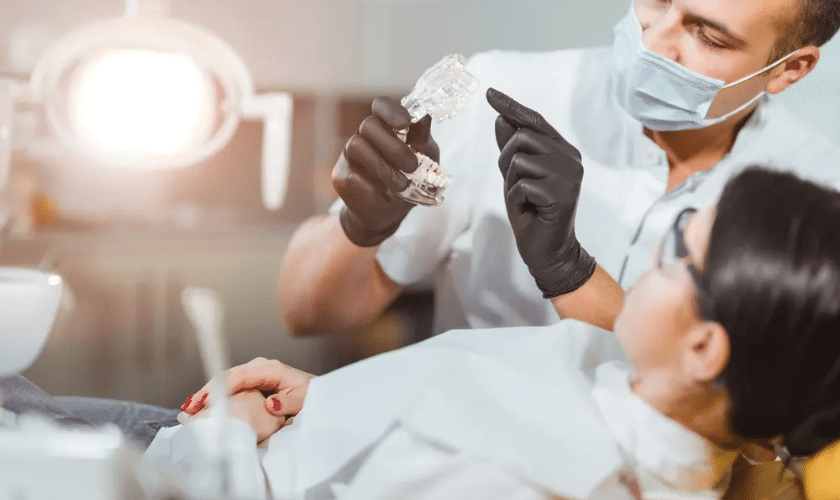
Are you considering dentures but have heard some myths that are holding you back? Don’t let misinformation prevent you from exploring this life-changing solution. In this blog post, we will debunk five common myths about dentures and give you the facts to help make an informed decision. Say goodbye to false beliefs and hello to a confident smile!
What is a Denture?
Dentures are prosthetic denture that replaces teeth that have been lost, broken, or removed. Dentures may be custom fitted to your mouth and can provide many benefits over traditional oral care. They can help you eat more comfortably, speak clearly, and smile confidently.
There are a variety of types of dentures, each with its own benefits and drawbacks. Here are some of the most common types:
Porcelain Denture: This type of denture is made out of porcelain materials and is the most durable option. It tends to be the least comfortable and needs to be replaced less often than other types of dentures.
Resin-Filled Denture: This type is made out of a material that is injected into molds of your teeth. The resin hardens around the tooth and provides a more permanent solution than a traditional denture adhesive. The downside is that it can be more sensitive to temperature changes, which can cause them to crack or fall out.
Impression-Molded Denture: This type is also made out of a material that’s injected into molds of your teeth. However, this time the material is shaped around your teeth using an impression taken before dental surgery. This type offers the best combination of durability and comfort but requires regular visits to a dentist for maintenance.
How Do Dentures Work?
Dentures are a type of appliance that help individuals with missing teeth. They are made from metal, plastic, or porcelain and come in different sizes and shapes to fit any individual’s mouth.
When someone has dentures, the denture “sits” on top of the other teeth in the mouth. The denture is attached to a bridge or prosthetic tooth that extends out into the person’s gum line. This allows the person to eat normally and speak without difficulty.
There are three main types of dentures: full dentures (which cover all of your teeth), partial dentures (which cover some but not all of your teeth), and false teeth (made from porcelain, plastic, or metal). Dentures come in different materials as well, including gold, silver, titanium, and more.
Dentures work by replacing lost teeth. When a dentist places them in your mouth, they create a custom fit for you using special dental impressions. Your dentist will then make a set of removable dental appliances called an “impressment.” These impressions will be used to create a new set of dentures that will fit better and last longer than your old ones.
Denture Myths
Dentures are one of the most common dental treatments. But are they really that great?
The truth is that dentures can be quite effective and can help improve your oral health. However, there are a few myths about dentures that you should be aware of. Here are four of the most common ones:
Myth #1: Dentures last forever
Dentures don’t last forever. Dentures can last anywhere from 6 to 12 months, but they will eventually need to be replaced. The denture material may start to wear down and the hinges may not hold up anymore.
Myth #2: It is difficult to eat when wearing dentures
Dentures are often thought to be difficult to eat from, but this is not always the case. In fact, many denture wearers find that they can easily eat regular food with their dentures in place. There are a few things that you need to keep in mind when eating with dentures:
Make sure that your dentures are properly fitted: This means that they fit well and snugly against your teeth and gums. If they are not fitting properly, you may experience discomfort when eating or chewing.
Check the fit of your dentures every time you put them on or take them off: If they become loose or dislodged, adjust them as needed using the adjustment screws at the back of the appliance.
Avoid biting down on your denture straps if possible: This can cause excessive stress on your teeth and wear down the straps over time. Instead, gently bite down on the side of the strap closest to your tooth – this will help ensure a good seal between your tooth and strap.
Choose foods that are easy to chew and swallow: Hard foods (such as crunchy nuts) should be avoided if possible, as they can be difficult to digest and causes dental problems later on in life for those who still wear dentures. Instead, choose softer foods such as fruits and vegetables.
Myth #3: Everyone knows you are wearing dentures
There are a few myths about dentures that many people believe. One myth is that everyone knows you are wearing dentures. However, this is not always the case. Another myth is that dentures make your mouth dry. This is not always the case either. Some people think that dentures will make their teeth fall out. Again, this is not always the case.
Myth #4: Dentures are too expensive
Dentures are not too expensive. In fact, many people find that dentures are actually quite affordable when compared to other dental treatments.
Myth #5: You do not have to visit your dentist after getting dentures
Dentures are a great way to replace missing teeth, but you don’t have to visit your dentist after getting them. In fact, you can usually keep your dentures clean with a simple toothbrush and water. If your dentures start to feel uncomfortable or if they become stained, you should take them in for a check-up.
There are many myths about dentures that people may believe, but the truth is that dentures are actually a very effective way of restoring oral health. Here are some of the most common myths about dentures debunked:
Dentures will make your teeth fall out.
This is definitely not true! In fact, most denture wearers experience less tooth loss than those who do not wear them. The reduction in cavities and plaque can be attributed to several factors, including the fact that dentures keep food from being trapped in between your teeth and the chewing surface of your gums, which helps to break down these harmful compounds. Additionally, wearing dentures can also help improve bone health since it can help to promote regular brushing and flossing habits.


